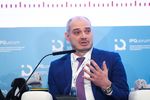Session «Standards in IP and IP in standards» was held in Svetlogorsk on the 12th of April 2019 in the framework of the International Forum - IPQuorum 2019. This session became a platform for discussion of standards in digital formats and interconnection between standards and intellectual property.
Head of GOST R (Rosstandart) Aleksey Abramov, Director General of STANDARTINFORM Viacheslav Vitushkin, First Deputy Director General of STANDARTINFORM Aleksandr Barkov, Head of the Federation of Intellectual Property Sergey Matveev and others took part in this session.
Head of GOST R, moderator of this session, Alexey Abramov formulated relevant issues of discussion in the following sentence – In what way standards overlap with the issues of intellectual property and in what manner digitalization change the ideology and approach for the development of standards.
Viacheslav Vitushkin began his report with the thought that it was necessary
to examine international experience in that field for the purposes of understanding of intellectual property and standards. Viacheslav Vitushkin also described current situation and paid special attention to the fact that use of patents in national standards was rare phenomenon in Russia. Speaker also noted that it was essential to change the procedure of development of standards in Russia in order
to consolidate the possibility of incorporation of objects of intellectual property.
First Deputy Director General of STANDARTINFORM Aleksandr Barkov elaborated on practice of distribution of standards. He paid special attention to SMART standards. Aleksandr highlighted that distinctive feature of new digital standards was the following: these standards have been developed exclusively for machines. Aleksandr Barkov also noted that digitalization of standards development was the way of all industrialized countries.
Head of the Federation of Intellectual Property Sergey Matveev highlighted that digital form of standard was part of production process. Sergey also noted that this digital form of standard was precious because it was well established and enabled to ensure quality and safety. Sergey also focused on the fact that SMART standard could not be considered as a document and as a result it was protected by copyright and patent rights.
Aleksey Abramov summed up the discussion during the session and noted that all necessary legislative changes would be prepared in future for the purposes of fixation of strategically comfortable conditions for digital standardization.



